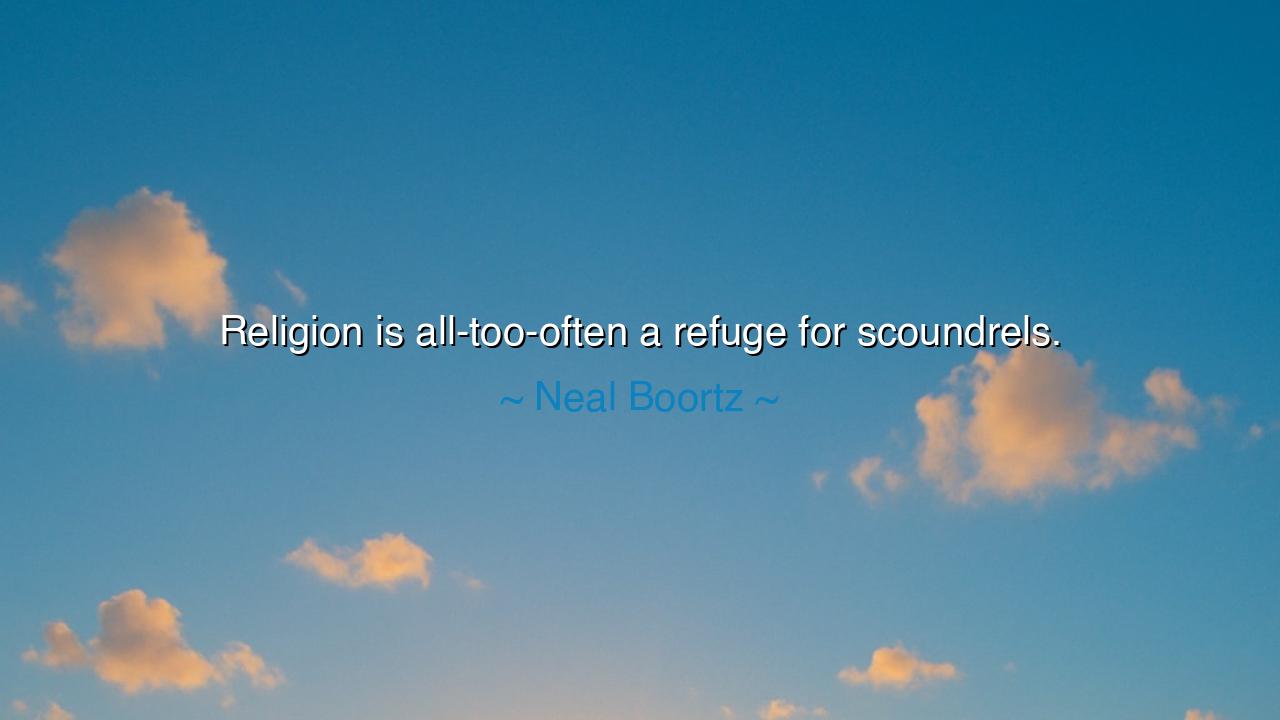
Religion is all-too-often a refuge for scoundrels.






“Religion is all-too-often a refuge for scoundrels.” Thus declared Neal Boortz, the sharp-tongued commentator of the modern age, whose words pierce through pretense like an arrow through false armor. Though his phrase may sound harsh to the ear, it echoes an ancient warning — one that sages and prophets have spoken in every generation: that power cloaked in piety is among the most dangerous of all deceptions. For when corruption wears the garments of holiness, when greed hides behind prayer, when cruelty claims the name of God — then the soul of faith itself is wounded.
Boortz’s words are not an attack upon religion itself, but upon its corruption — the way it has too often been used by the cunning to shield their misdeeds and sanctify their ambition. Throughout history, scoundrels have discovered that to claim divine authority is to silence opposition, to place their actions beyond question. They build altars not to worship the Divine, but to enthrone themselves. Thus, what was meant to free the human spirit is sometimes used to enslave it; what was meant to heal becomes a tool of harm. This is the refuge of which Boortz speaks — not the sanctuary of the sincere believer, but the fortress of hypocrisy, where men hide their corruption behind sacred words.
The truth of this warning can be found in every age. Consider the shadowed chapter of the Spanish Inquisition, when the Church, meant to embody mercy, became the instrument of fear. Thousands were tortured or killed, not for crimes of conscience, but for failing to submit to the power of men who claimed to act for God. Their judges and executioners, draped in holy vestments, spoke the language of faith but acted with the cruelty of tyrants. And yet, they believed themselves righteous — for such is the blinding power of religious pretense, when men mistake authority for virtue. It is not faith that destroys, but the faithless who claim its name.
Nor was this tragedy confined to the past. Even in our own era, we have seen men of power and influence — preachers, politicians, and princes alike — who invoke God’s name while pursuing their own greed or lust. They quote scripture while deceiving their followers, collect offerings while living in luxury, and speak of salvation while exploiting the innocent. Their faith is a mask, not a light; their altar, a stage. To them, religion is not a path to truth but a shield from accountability. Thus, Boortz’s words resound not as cynicism, but as a moral summons: to look beyond the robe, the ritual, and the rhetoric — and seek the spirit of truth itself.
Yet let us not mistake his message for contempt of true belief. For the same fire that exposes hypocrisy also illuminates sincerity. There have always been those — saints, mystics, and humble souls — who serve their faith with integrity and love, who walk the path of compassion without pride or pretense. From Francis of Assisi, who renounced wealth to live among the poor, to Mahatma Gandhi, who bound politics and prayer in a single thread of peace, such souls remind us that religion at its purest is service, not self-interest. It is the refuge not of scoundrels, but of seekers; not of manipulators, but of those who dare to live truthfully.
The lesson, then, is not to reject faith, but to purify it. We must learn to discern between the appearance of holiness and the substance of it, to test every preacher, ruler, or teacher not by their words, but by their deeds. True religion does not demand blind obedience; it invites open eyes and awakened hearts. It is the courage to ask: “Does this belief bring more compassion, more justice, more humility into the world?” If it does, it is sacred. If it does not, it is false, no matter how loudly it calls upon the divine.
So, my child, remember this: do not let the corruption of a few blind you to the beauty of truth itself. Religion, like fire, can warm or destroy — it depends upon the hands that hold it. Walk not by the voice of men who shout from pulpits of pride, but by the quiet whisper within your conscience. Seek the God that dwells not in the towers of power, but in the humble heart that serves others. For faith without integrity is emptiness, but faith lived with compassion is the truest light the world will ever know.
And thus, Boortz’s words remain a warning for every age: beware of those who use the sacred to hide their sins, for false piety is the oldest disguise of evil. Let your faith — whether in God, in truth, or in humanity — be honest, courageous, and kind. Be the one who does not seek refuge in religion, but who becomes a refuge through it — a shelter of compassion, a builder of peace, a bearer of truth. In doing so, you will redeem the very thing that the scoundrels have defiled, and make of your life not a mask of faith, but its living flame.






AAdministratorAdministrator
Welcome, honored guests. Please leave a comment, we will respond soon